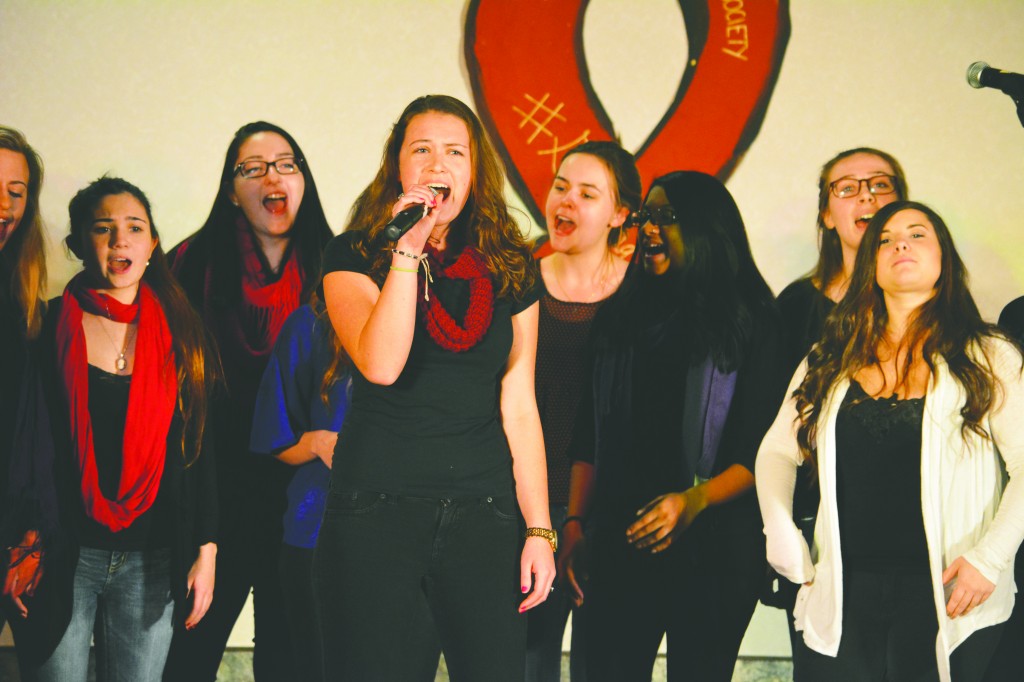
HIV/AIDS affects millions of people around the world, from wealthy celebrities like Magic Johnson and Arthur Ashe to minimum wage workers struggling just to survive. On Tuesday, Binghamton University campus groups helped bring the issue home.
Charles Drew Minority Pre-Health Society (CDMPHS) hosted the fourth-annual AIDS Awareness Festival in the Old Union Hall as part of national AIDS Awareness Week. On-campus organizations SHADES, REACH, WE SPEAK BU and Delta Epsilon Mu tabled and gave out informational pamphlets and condoms.
The festival included musical performances, a spoken word performance, trivia challenges and guest speaker Kenneth Naughton, who spoke about his experience with HIV/AIDS.
Naughton volunteers his time as an inspirational speaker to STAP (Southern Tier AIDS Program), which has supported past BU AIDS Awareness events. He spoke about his struggles living with AIDS for 18 years and how he used to feel ashamed because many people in his life shunned him and were afraid of it.
“This is a big thing for me to come out and speak because I feel it’s very important that all people, young and old, need to educate themselves against the virus and need to protect themselves,” Naughton said. “If you don’t protect yourself, no one is going to protect you.”
HIV, which stands for human immunodeficiency virus, infects a certain type of white blood cell called a CD4 cell, or T-cell. It takes over the cell and begins reproducing. When a person’s CD4 cell count is below 200 (a normal count is between 800-1200), HIV leads to AIDS, which leaves the immune system unable to fight infections.
The virus can be transmitted through contact with HIV-positive bodily fluids by having unprotected sex, sharing needles or breastfeeding.
According to aids.gov, over one million people are living with HIV in the United States and 1 in 7 living with HIV are unaware of their infection. Symptoms include weight loss, night sweats and fever, blotchy skin and memory loss. People can live for an average of 10 years with HIV without showing symptoms.
In the past, there was a $3 admission fee to the festival, but this year students were able to witness an African Olu dance, a spoken-word poem about sex and self-worth, and songs sung by the Gospel Choir and Pegs a cappella for free.
In between each performance, members of the CDMPHS Executive Board asked trivia questions to the audience for free shirts. Questions ranged from what kind of cells the virus attacks to what percentage of people are infected via sexual intercourse.
Uloaku Ireaja, a senior majoring in integrative neuroscience and the vice president of CDMPHS, said that the event has grown since it was first held, and she hopes to see the same growth continue as the society works toward eliminating AIDS-related discrimination, deaths and new infections.
“It’s something that we’re all susceptible to, especially at this age of people not being as careful as they should be when it comes to the protective method while having sexual intercourse,” Ireaja said. “We work within the general theme of AIDS awareness week which is Getting to Zero.”
Mikhail Bryan, senior majoring in philosophy, politics and law, said that he enjoyed the performances and gained new insights about living with HIV/AIDS.
“I learned about a lot of the stigmas that are related to HIV and the hardships that these people go through every day, but it’s not the end of life,” Bryan said. “You should just spread that message to family members, friends and anyone who might know somebody.
Naughton said that many people still believe that the virus can be contracted through general touch, like high-fiving and hugging. He said that HIV-positive people have nothing to be ashamed of and he wanted to keep spreading that message after the festival.
“I can’t change my past but I can change my future,” Naughton said. “My future is telling me to keep speaking for those who are HIV positive and those who are afraid to accept it.”


